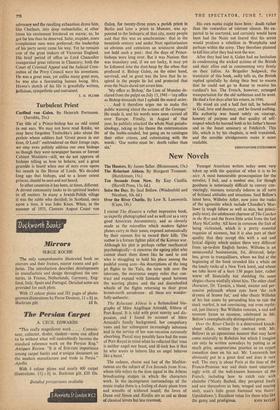New Novels
I FOUND The Hunters a rather impressive book, as expertly photographed and as well cut as a very good American documentary, and as cleverly made as the microfilm which modern fighter planes carry in their noses, exposed automatically by their cannon fire to record their kills. The author is a former fighter pilot of the Korean war. Although his plot is perhaps rather mechanical psychologically—it concerns the ageing pilot who cannot shoot them down like he used to and who is struggling to hold his place among the pushful young aces—his descriptions of the long jet flights to the Yalu, the terse talk over the intercom, the enormous empty miles that con- tract and expand with fantastic speed between the warring planes, and the sad disembodied whistle of the flights returning to their great brown-earth aerodrome : all these are wonder- fully authentic.
The Reluctant Abbess is a fictionalised bio- graphy of Mere Angdlique Arnauld, Abbess of Port-Royal. It is told with great suavity and dis- passion, and I found its account of Mere Arnauld's family background, her compulsory vows and her subsequent increasingly inhuman zeal in the service of her non-vocation extremely absorbing. Pascal may possibly have had the nuns of Port-Royal in mind when he reflected that 'man is neither angel nor beast, and ill-luck has it that he who wants to behave like an angel behaves like a beast.'
The sadness, charm and lust of the Mediter- ranean are the subject of Ten Seconds from Now, whose title refers to the time signal in the Athens broadcasting station in which the characters work. In the incongruous surroundings of the music studio there is a feeling of dusty plane trees and wreaths of withered laurel; the loves of Dam and Simos and /Emilia are as sad as those of classical lovers but less resonant. Younger American writers today seem very taken up with the question of what it is to be nice. A most honourable preoccupation for the novelist, I feel, and a modest one, for though goodness is notoriously difficult to convey con- vincingly, niceness naturally inheres in all sorts of fictional attitudes and situations. Saul Bellow's latest hero, Wilhelm Adler, now joins the ranks of the agreeable which include Chandler's Mar- lowe (a tough fellow as well as nice, but princi- pally nice), the-adolescent charmer of The Catcher in the Rye and the brave little artist from the last Mary McCarthy. All have in common the fact of being victimised, which is a pretty essential requisite of niceness, but it is also part of their quality that they accept this with a sad and lyrical dignity which makes them very different from up-to-date English heroes. Wilhelm is an unsuccessful businessman, fat, divorced, help- less, given to tranquillisers, whom we find at the beginning of the book stranded like a whale on the lonely rocks of a New York hotel, and whom we take leave of a bare 150 pages later, rather worse off financially but shedding the same elegiac charm wistfully about him. The other chief character, Dr. Tamkin, a bland, sinister and per- suasive polymath whose eyes have 'the rich dryness of brown fur,' and who cheats Wilhelm of his last assets by persuading him to ride the stock market, is not convincing, not even mythi- cal, just literary. But Wilhelm remains, a real and reverent hymn to niceness, celebrated in Mr. Bellow's unemphatically distinguished prose.
Over the River Charlie is a determined knock- about affair, written (by contrast with' Mr. Bellow) in an uproarious manner that may have come naturally to Rabelais but which I imagine can only be written nowadays by putting in as much grim, unuproarious practice as an expert comedian does on his act. Mr. Lansworth has obviously put in a great deal and does it very well. The story is about Paris at the time of the Franco-Prussian war and deals most entertain- ingly with all the well-known humours of the French, including how to catch rats with absinthe (Nicely flushed, they perspired freely and saw themselves as bats, winged and soaring aloft, man's little green footstool was theirs! Upsidedown.'). Excellent value for those who like the gamy and prodigious. JOHN BAYLEY


































 Previous page
Previous page